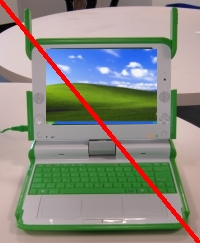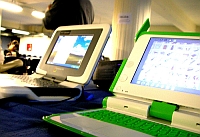Remember that Microsoft has a few test units of the OLPC, and the laptop itself was altered to include a PCMCIA slot at Microsoft's request, and Microsoft has been hard at work getting XP to run on the OLPC - which, with it's new hardware specs, should be (slightly) easier.
Jon wonders if Microsoft is getting ready to encourage governments to replace the Sugar UI on all of their OLPC units, which conveniently would fulfill the "free to students" clause. Maybe that's why the OLPC Leadership has come out in favor of what is ostensibly direct competition to their Constructionist model of learning in Computer World:
"For the good of the world, it’s a positive thing," said Michael Evans, vice president of corporate and business development at Linux provider Red Hat Inc. and a director of Cambridge, Mass.-based OLPCInteresting, note that Michael Evans left one major company off the list, the only company that is directly competing with the Children's Machine XO hardware: IntelNicholas Negroponte "just wants to see lower-cost computers in kids’ hands," he said. "If that means other companies filling this need, he’d still be happy as a clam. Our mission is not to beat Apple, Dell or Microsoft."
And what might Nicholas Negroponte have to say about Intel's Classmate PC?
We welcome Intel. The Classmate certainly is a reaction to and copy of OLPC's mission and validates it as such. Its name speaks for itself with regard to their emphasis on classroom technology. We do not compete with them, but they believe they compete with us. Such asymmetry is rare.Ouch! Now that's haterism for Intel! Maybe Negroponte is still annoyed their low-cost computing competition changed OLPC's mission?They have been very underhanded and destructive in the process of sales - theirs is a market, ours is a mission. Since OLPC is a nonprofit, you can liken Intel's behavior to Johnson & Johnson beating up on the Red Cross because they use Ace bandages.
Regardless, while Intel is no angel, and the Classmate PC is "a stripped down, low specced laptop built down to a price", according to Wired, not the technological marvel of the OLPC, Negroponte might want to reconsider his OLPC is the Red Cross analogy. The International Red Cross builds disaster response on local capacities, strengthening communities by employing local staff, purchasing local materials and trading with local companies - not J&J or Ace. Intel is similar with its global manufacturing plants.
Negroponte, on the other hand, has One Laptop Per Child countries outsourcing $30 Billion dollars of annual laptop production to just China, no local OLPC XO assembly involved. A very un-Red Cross approach.




It's almost as if the OLPC chieftains got Red Hat et al to build a toy like Sugar, just to get a negotiating position over Microsoft to have it ship a cheap Windows for the thing.
That seems kind of convoluted to me. What's in it for the OLPC folks to go through gyrations like that?
On the other hand, I can see Microsoft's concerns. If the OLPC is a success, that's not just a market MS will have no place in but X zillions of newly minted open source programmers and support people.
Open source doesn't compete with MS commercially but if MS is clearly playing "catch-up" to open source it'll just add one more term to the competitive equation and not to MS' benefit. If you're in business and you really need some new capability that's currently available in open source software why would you wait until Microsoft manages to catch up?
This is a real shame. What started as a fairly noble cause has just turned into a trojon horse to give a western monopoly a new monopoly in the developing world. I've heard a few criticisms calling the development and design 'imperialist', but it really is now the real thing.